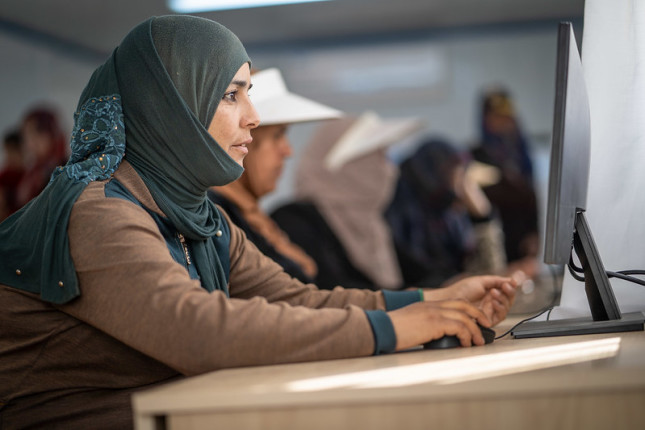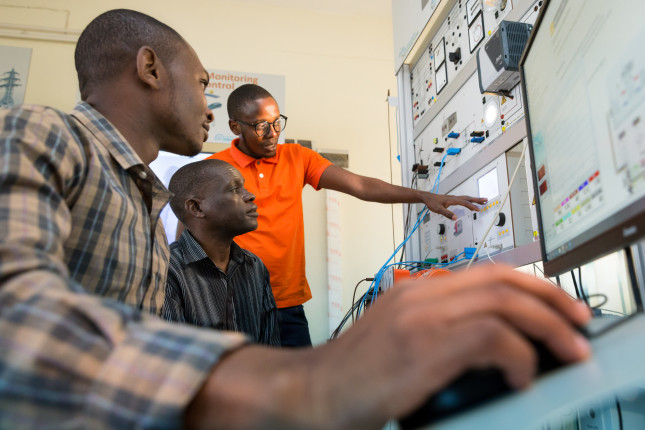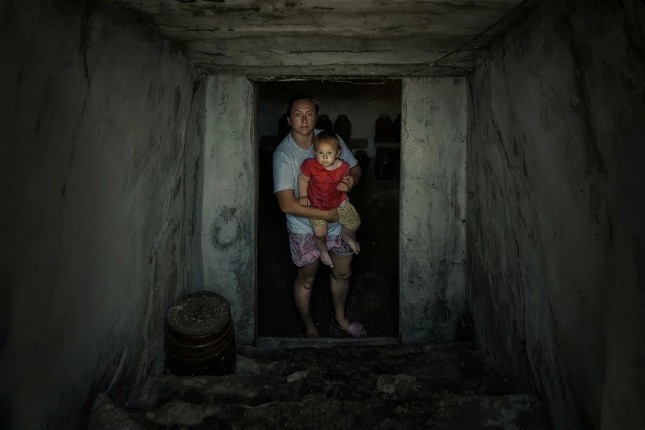-
Shaken to The Core: The Plight of Syrian Refugees After February’s Earthquake
›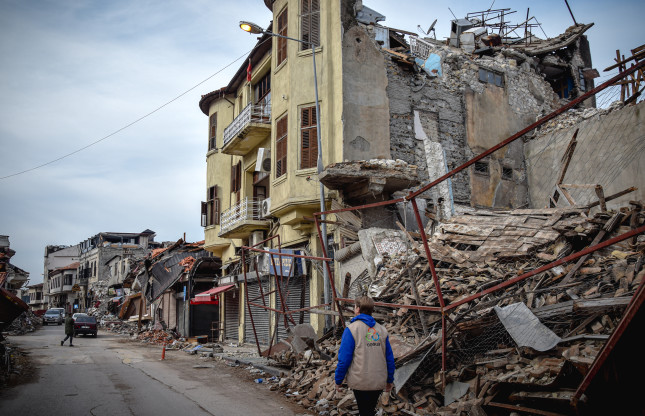
Madiha vaguely remembers her family fleeing war-torn Syria. But even a decade later, she still bursts into tears describing their midnight escape across the border to Turkey. She and her family were forced to flee after losing family members in a civil war in which they had no stake.
Little did Madiha—who is now 11 years old—and her family know they would experience another monumental trauma a decade later. This time, it was a 7.8 magnitude earthquake that rocked large swaths of southern Turkey on early February 6, 2023.
The roof they built with their own hands collapsed over their heads, killing several of Madiha’s nieces and siblings. “A large piece of brick fell on my mother’s leg, but she luckily survived,” she said tearfully.
-
Building Global Collaboration on Infrastructure: A Conversation with Amos Hochstein
›April 7, 2023 // By Claire Doyle Today’s geopolitical climate, paired with the accelerating energy transition, means it is more important than ever to collaborate on international infrastructure investments. This episode of the New Security Broadcast features a recent Wilson Center panel discussion with Amos Hochstein, Special Presidential Coordinator for Global Infrastructure and Energy Security. Moderated by Mark Kennedy, Director of the Wilson Center’s Wahba Institute for Strategic Competition, and Wilson Center Global Fellow Sharon Burke, the conversation explores what U.S. cooperation—with both developed and developing countries—should look like to ensure that the unfolding technology and energy revolutions contribute to diplomacy and benefit all countries.
Today’s geopolitical climate, paired with the accelerating energy transition, means it is more important than ever to collaborate on international infrastructure investments. This episode of the New Security Broadcast features a recent Wilson Center panel discussion with Amos Hochstein, Special Presidential Coordinator for Global Infrastructure and Energy Security. Moderated by Mark Kennedy, Director of the Wilson Center’s Wahba Institute for Strategic Competition, and Wilson Center Global Fellow Sharon Burke, the conversation explores what U.S. cooperation—with both developed and developing countries—should look like to ensure that the unfolding technology and energy revolutions contribute to diplomacy and benefit all countries. -
Women’s Leadership: Efforts to Close the Gender Gap
›
In this Women’s History Month edition of Wilson Center NOW, Women’s Leadership: Efforts to Close the Gender Gap, John Milewski, Moderator of the Wilson Center NOW series, interviews Sarah Barnes, Project Director for the Wilson Center’s Maternal Health Initiative, and Samantha Karlin, Founder and CEO of Empower Global, a gender consulting firm that works with organizations to help them better recruit, retain, and advance women. They discuss feminist leadership, women in the think tank space, and the work remaining to achieve gender equality. The 2023 Women’s History Month theme is Women Who Tell Our Stories.
-
New Security Broadcast | Ecoaction’s Kostiantyn Krynytskyi on Securing Ukraine’s Energy Future
› Since the start of Russia’s war in Ukraine, Kostiantyn Krynytskyi, Head of Energy at Ecoaction, and his colleagues, have been tracking the ongoing environmental damage caused by Russia’s aggression. In today’s episode of New Security Broadcast, ECSP Director Lauren Risi speaks with Krynytskyi to discuss how Ecoaction, the largest environmental NGO in Ukraine, is mapping out the environmental destruction caused by the war and working to develop a green post-war reconstruction of Ukraine. Krynytskyi shares how the war has impacted Ecoaction’s priorities and shifted its approach to address short-term energy needs in Ukraine while safeguarding a secure and sustainable energy future.
Since the start of Russia’s war in Ukraine, Kostiantyn Krynytskyi, Head of Energy at Ecoaction, and his colleagues, have been tracking the ongoing environmental damage caused by Russia’s aggression. In today’s episode of New Security Broadcast, ECSP Director Lauren Risi speaks with Krynytskyi to discuss how Ecoaction, the largest environmental NGO in Ukraine, is mapping out the environmental destruction caused by the war and working to develop a green post-war reconstruction of Ukraine. Krynytskyi shares how the war has impacted Ecoaction’s priorities and shifted its approach to address short-term energy needs in Ukraine while safeguarding a secure and sustainable energy future. -
Pushing Back the Pushback: Addressing the Complexities of Gender and Migration
›
“We must unite our efforts to push back the pushback,” said Katrín Jakobsdóttir, Prime Minister of Iceland, at a recent side event during the 67th Session of the Commission on the Status of Women (CSW67). Humanitarian crises and forced displacement increase pushback against women’s and girl’s human rights and safety. Jakobsdóttir called for global efforts to recognize this inequity and to fight for gender equality in humanitarian responses.
-
Меры социальной поддержки Детей войны Орловской области
›March 28, 2023 // By Theo WilsonContent
Парня утром выписали из больницы. Жалуется на боль в желудке. Признаков болезни не обнаруживаем.
Организация помогает людям, приехавшим в Россию из Донбасса, оплатить расходы на лечение. Также она помогает оплачивать дорогу, жилье, питание и лекарства. Эта структура объединяет 27 национальных ассоциаций и монастырей Мальтийского ордена. Занимается помощью в чрезвычайных ситуациях, работает в Украине с 1990-х ипомогает сейчас. Сотрудники раздают еду, воду, одеяла и оказывают медицинскую и психологическую помощь, а также помогают беженцам на границе. Пожертвовать можно конкретно на помощь украинцам, несмотря на то, что организация работает в разных странах.
Русфонд.ДЦП
По словам историков, в годы Великой Отечественной войны органы милиции были сориентированы на поиск детей, оставшихся без родительского надзора. В ходе специальных операций детей забирали с рынков, привокзальных площадей и из других мест массового скопления людей. Так, в 1943 году с улиц забрали около 800 тыс. Согласно постановлению, для помощи детям создавались специальные комиссии, куда входили представители исполкомов, комсомола, профсоюзов, а также органов НКВД, образования и здравоохранения. Кроме того, документ предусматривал расширение сети приёмников-распределителей, в которые направлялись беспризорные и безнадзорные дети в возрасте до 15 лет включительно. «Великая Отечественная война потребовала от СССР неотложных мер по оказанию помощи детям, оказавшимся без родительской опеки и поддержки», — подчеркнул Александр Михайлов.
В действующей армии были созданы управления особоуполномоченных общества, в их распоряжении состояли уполномоченные общества. Общество направило на фронты свои учреждения, формирование которых шло вплоть до осени 1917 г. Многие учреждения общества, организованные на целевые пожертвования частных лиц или учреждений, носили имена жертвователей. Военное ведомство полностью передало обществу задачу эвакуации и наблюдения за психиатрическими больными.
Какие выплаты и льготы полагаются детям войны
У офицеров находилось личное оружие и было зафиксировано много Артур Золотаревськийв злоупотребления им. Привыкнув во фронтовых условиях мало ценить чужую жизнь и не всегда обладая человеческим достоинством, люди часто считали себя героями, которым теперь все дозволено. Возвращавшиеся с фронта мужья порой стреляли в неверных жен, в их любовников, иногда и в себя. Вспоминаю несколько таких случаев, на которые выезжала лично. Почему врачам не были выданы металлические каски для работы во время тревог? Не знаю, но за всю войну никто из нашего персонала не был ни ранен, ни убит.
«Украинская волонтерская служба» набирает волонтеров для помощи людям – есть возможность помочь удаленно. Волонтеры буквально за ночь создали сайт для граждан Беларуси «Застанься дома», где объяснили, почему беларусским военным нельзя выполнять приказ и идти воевать против Украины. Вы можете показать этот сайт знакомым или иным образом призвать соотечественников не участвовать в кровопролитии. Здесь можно присоединиться к волонтерам, которые дежурят на границе.
Общественных организаций. Тяготы войны со всем трагизмом отразились на всем детском населении страны, поэтому рядом обществ, особенно Всероссийским попечительством по охране материнства и младенчества, была поставлена задача о необходимости предоставления помощи все детям. Кроме того, со всей очевидностью выявилась необходимость государственной охраны материнства и младенчества, о чем неоднократно говорилось многими общественными деятелями и детскими врачами. Обзоры деятельности благотворительных учреждений.
- Внеочередное получение места в домах престарелых, учреждениях для инвалидов и центрах соцобслуживания.
- Обеспечьте проходимость верхних дыхательных путей.
- Спасение миров – занятие не для смертных.
- Вместе со своими помощниками – фельдшерами она пешком добралась до места и под вражеским огнем организовала подачу первой помощи пострадавшим.
- В этой статье я опишу консультативную работу, которая осуществлялась в послевоенной ситуации людьми, большая часть которых не имела психологического образования.
Внеочередное установление стационарных телефонов. Такой льготой могут воспользоваться дети войны, проживающие в Москве. Компенсация расходов по капитальному ремонту. Например, в Приморском крае дети войны получают 100-процентную компенсацию.
Спасибо за внимание!
Нам даже говорили, что спокойствие немногочисленного персонала скорой помощи часто положительно влияло на медицинский персонал других организаций. Талайко выехала в очаг поражения в Сокольнический район. Машина была повреждена осколками снарядов, но А.3. Вместе со своими помощниками – фельдшерами она пешком добралась до места и под вражеским огнем организовала подачу первой помощи пострадавшим.
- Программа «Спаси ребенка» создана для оказания помощи детям (и семьям с детьми), пострадавшим в результате военных действий, стихийных бедствий и катастроф.
- На мой заданный Александру Сергеевичу вопрос о количестве пострадавших во время бомбежек Москвы он сказал мне, что жертв от налетов немецкой авиации было меньше, чем от самого затемнения (не назвав, конечно, ни той, ни другой цифры).
- «Сразу после вторжения мы начали помогать, отправляя одежду и еду, – рассказывает Шмидт.
- Один трамвай наехал на другой.
Занимался устройством санаториев и больниц для георгиевских кавалеров, улучшением их быта. В комитете существовал ряд комиссий, которые организовывали театральные спектакли и концерты в санаториях, занимались сбором стихов, рассказов и воспоминаний о войне, устраивали выставки и собирали материалы для создания музея трофеев Великой войны. Деятельность комитета прекратилась в 1917 г.
-
What Will Change at the World Bank Mean for Climate Policy?
›
World Bank President David Malpass announced his resignation in mid-February 2023, and will step down by June 2023—about a year before finishing his five-year term. As several public officials indicated after the announcement, the climate legacy Malpass leaves behind is lacking. Indeed, the Bank itself has also been under scrutiny with recent calls for reform on climate finance.
The Biden Administration quickly announced Ajay Banga as their nominee in mid-February. If confirmed, Banga will step into this role in a high-profile moment, and his own stance on climate issues is already under close examination.
-
Women and Art at a Time of War: Acknowledging Ukrainian Women
›
“War is central to history. History has been written (and painted) by men. This exhibition provides a platform for women narrators of history and also examines gendered perspectives of war,” said art curator Monika Fabijanska, referring to the exhibit “Women at War” she recently put together, which was on display at the Stanford in Washington Art Gallery from January through March 2023.
 A Publication of the Stimson Center.
A Publication of the Stimson Center.

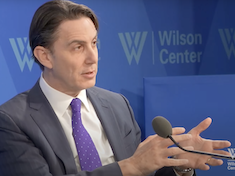 Today’s geopolitical climate, paired with the accelerating energy transition, means it is more important than ever to collaborate on international infrastructure investments. This episode of the New Security Broadcast features a
Today’s geopolitical climate, paired with the accelerating energy transition, means it is more important than ever to collaborate on international infrastructure investments. This episode of the New Security Broadcast features a 

